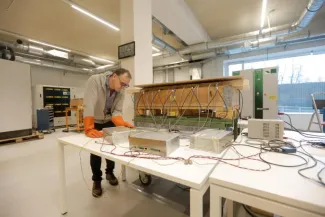We need batteries to facilitate the energy transition. Batteries are an excellent solution to close the gap between supply and demand. That’s why VITO/EnergyVille has a battery testing lab: a unique infrastructure to expedite the development of new battery chemistry and designs, which can also be used by third parties.
Batteries to facilitate the energy transition
Renewable energy sources have many highs and lows when it comes to generative capacity. That’s why we need a way to store electrical energy. Battery systems for electrical energy storage are a crucial part of the energy transition. Especially now that the automotive industry is switching to electric vehicles, batteries will become increasingly important in our lives.
Battery systems exist in many shapes and forms. Choosing the perfect kind for a specific application is a complex matter that requires quite a bit of expertise and knowledge.
Who is this lab interesting for?
- Battery producers
- Battery suppliers
- Users of electrical storage systems in their application (Engineering, Procurement, Construction)
- Battery repurposing initiatives
What can you use the lab for?
- Static capacitance tests at different discharge currents
- Discharge tests at constant power
- Hybrid pulse power characterisation (HPCC) tests
- Self-discharge tests
- Thermal performance tests
- Energy efficiency tests
- Charge life tests
- Discharge life tests
- Calendar life tests
- Thermal runaway tests
- Overvoltage and overcurrent
Testing batteries in various circumstances
VITO/EnergyVille has extensive experience in objectively assessing batteries based on independent standards. To do this, we have one of Flanders’ most advanced battery testing labs.
Both commercially available technologies and prototypes can be tested in various circumstances here. This way, we can assess the performance of different kinds of batteries at the same time, in all kinds of temperatures.
We also have self-discharge meters that allow us to track the kind of ageing mechanisms that take place in the batteries. The safety of batteries is tested in a special explosion room.
In VITO/EnergyVille’s battery testing lab, you can carry out various performance and lifespan tests, such as:
- Static capacity tests at different discharge currents
- Constant power discharge tests
- Thermal performance tests
- Energy efficiency tests
- Charge-sustaining life cycle tests
- Charge-depleting life cycle tests
- And so much more
The assets of VITO/EnergyVille’s battery testing lab
We work for governments, industrial parties and companies that are interested in implementing battery systems in their applications.
- Our state-of-the-art equipment allow you to test batteries and ultra caps at the cell, module and system level, regardless of the specific technology or type of cell.
- The battery testing lab adheres to the international quality, environmental and security standards ISO 9001, ISO 14001 and OHSAS 18001.
- You get to rely on our experience in developing custom testing procedures equivalent to cycles in real applications.
- Our experts will help you turn your test results into advice for a specific application. We can also support you in product development and the integration of your technologies if you want us to.




